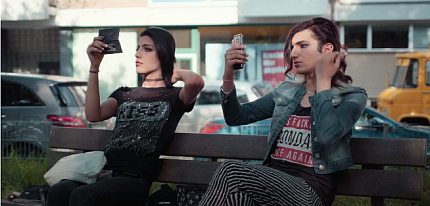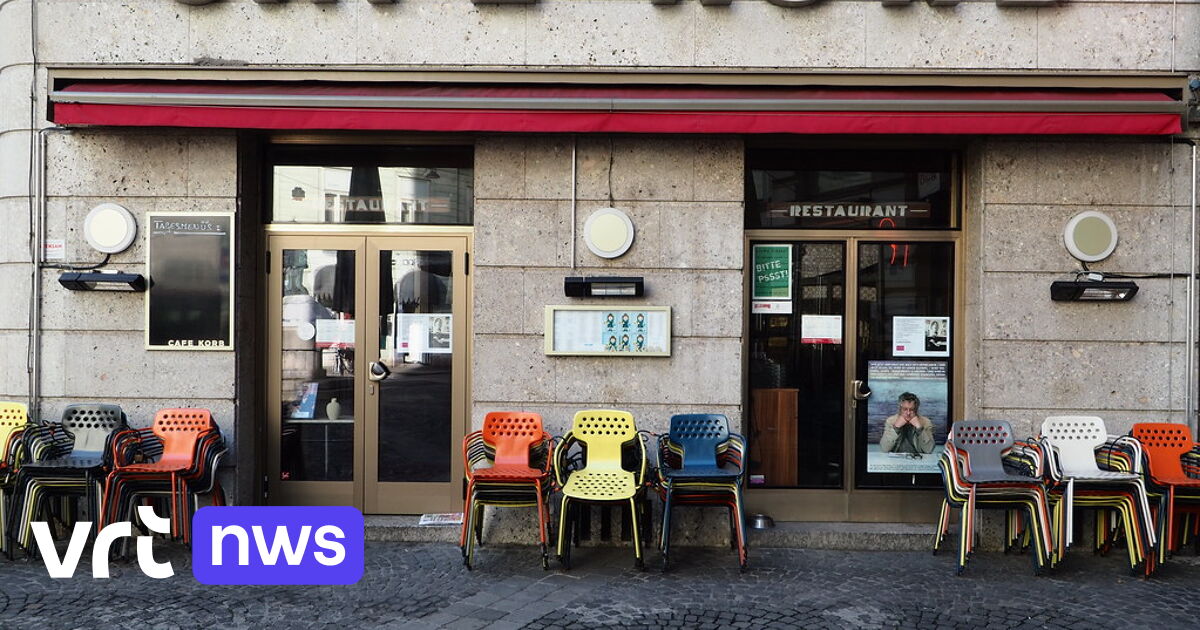On the island of Fårö, high up off the Swedish Baltic coast, has Ingmar Bergman filmed his masterpieces: “Scenes of a Marriage”, “Persona”, “As in a Mirror”. For the director, the island was a source of inspiration and a refuge in life crises. Fifty years later, Tony and Chris come to Fårö, not to cope with a crisis here, but to spend their summer. Both are directors, the much older and more successful Tony (Tim Roth) has received a grant from the Bergman Foundation, Chris (Vicky Krieps) accompanies him, younger and more insecure, but with more questions about life and art. Behind these two people it is not difficult to find the director Mia Hansen–Lion and her life partner Olivier Assayas to recognize, which does not mean that it is one-to-one an autobiographical story; but that Hansen-Løve, as in her other films, also from one Living with the movie tells because this life is hers.
The two are allowed to live and work in Bergman’s house during the summer to be inspired by Bergman’s work, the place, its people, the light. When Chris groans that she feels like a failure in front of her father, Tony coolly tells her that no one expects “persona” from her. The two roam across the sun-drenched island and through its picturesque dunes, Tony has to go to a panel discussion in the Bergman Museum every now and then, Chris skips the Bergman safari, but buys himself for it sunglassesas she wore Bibi Andersson, and of course the two sleep in the exact same bed in which “Scenes of a Marriage” was filmed. No different from the tourist tours, for Chris and Tony this is the film “after which millions of people got divorced” – and not a work whose profound sadness shakes one lastingly. Chris doesn’t want to be dragged down by Bergman’s desperation: “His films are tough, but they’re good for me,” says Tony. “His films hurt me,” says Chris.
Why did he have to treat his nine children – from six different women – so badly? Can’t you be a great artist and still be a good father? Chris calls coherence of life and work, the Swedish museum director dryly counters that Bergman was cruel in both film and life. But why did his characters always have to be so dark? If he couldn’t have explored the brighter sides of life – for example happiness?
Mia Hansen-Løve has already shown her determination not to look into the abyss in previous films. As if it were a matter of willpower to see the rising sun behind the cliffs. She loves filmmaking, the Parisian film circles, intellectual glamor, aesthetic subtlety. So why not show how happy that makes you? Is that inexperienced? When Bergman shows the island in pictures of dazzling beauty, Hansen-Løve bathes it in a light of mild warmth. With her there are no hard cuts, no relentless camera, but gentle movements and flattering perspectives. The Stockholm student Chris starts flirting with appears so gentle and ephemeral that you don’t know if he’s real.

In “The Father of My Children” the director drew a loving portrait of the producer Humbert Balsan, who committed suicide at the age of fifty. Instead of exploring what made this man desperate, she shared about him as a wonderful person, friend, and family man. In “Eden” she celebrated the French touch of the nineties. As a philosophy professor, Isabelle Huppert defied all the challenges of life in “What is coming” – her mother dies, her husband leaves her, her publishing house ends her book series – with the iron will not to understand such events as losses, but as Gain in freedom.
Now in “Bergman Island” Chris is a director who means well with life, but with whom it means life well. The Luxembourger Vicky Krieps is an excellent cast for this, not only because her light accent hints at Hansen-Løve’s Danish background. Long, delicate and graceful at the same time, she wonderfully embodies that type of woman who loves herself does not have to conquer a space: Others will overturn to get the stones out of her way. She has already played Daniel Day-Lewis on the wall in “Der Seidene Faden”. And so Tim Roth as Tony can do nothing else than to express his trust in her talent in a somewhat fatherly manner.
But just when you begin to wish that he would oppose her in order to put the loveliness to the test, the film takes a turn. Chris talks about her film idea that she developed on Fårö and that is beginning to unfold before our eyes: The director Amy (also aptly cast with Mia Wasikowski) comes to a Swedish island for the wedding of her friends, where she meets her great childhood sweetheart again .
At first glance, this film appears in the film – “The White Dress” – as a sensual, carefree romance among successful millennials Against–Bergman so to speak, in which the melancholy only gives the exile even more appeal. Here Bergman’s despisers blaspheme the fact that he dodged the army with a boil as an excuse during World War II. And who, please, didn’t have a patriarchal father? At second glance, this film in the film is also a self-deprecating comment by the director on herself, an anti-Hansen-Løve, who turns “Bergman Island” into a self-critical reflection on filmmaking, creativity and, in the end, narcissism : The director Amy, who so willingly plunges into the exciting emotional chaos, remains unaffected by deeper conflicts of conscience. She’s not unfaithful, she just loves two people – and happily dances to Abba’s “The Winner Takes it All”. Ingmar Bergman would turn around in his grave.
Thekla Dannenberg
Bergman Island – France 2021 – Director: Mia Hansen-Løve – Cast: Vicky Krieps, Tim Roth, Grace Delrue, Mia Wasikowska, Anders Lanielsen Lie – Running time: 112 minutes.
—

“I should be given an Oscar for it,” says Lohan about her make-up skills. She and her sister Samar sit on a park bench in Stuttgart and give their appearance the finishing touch. The make-up is shamelessly over the top, the glittering clothes decorated with slogans like “It’s f # cking Monday once again” are flashy and the girls diva-like and cheeky. After the two boys Transfrauen from the documentary “Zuhurs Töchter” in hers Syrian homeland had to fear for their lives, Germany seems to them to be a kind of paradise for self-realization, despite the hostility that is still common on a daily basis. They dress up in public because they are not allowed to do so in their conservative home.
the alienation between the freedom-loving daughters and their family is well advanced at the beginning of the film. While Lohan and Samar roam through queer clubs, their relatives – father, mother, second wife and two younger siblings – stay almost exclusively in the refugee home. In front of the container-like dwellings, people play ball, dance or smoke shisha. In the apartment, however, which is decorated, among other things, with a neon-colored plush snake and a poster of PKK leader Öcalan, it usually remains calm and tense, apart from the humming of a computer game.
The directors Laurentia Genske and Robin Humboldt tell, observing rather than dramatizing, of two hardly touching worlds. Lohan and Samar are planning their future in Germany undauntedly optimistic. You can always see them posing sensually and gracefully in front of the mirror or smartphone, perfectly rehearsing their dream role. Your family, on the other hand, has not yet really arrived. Mother Zuhur complains that the newly learned sentences from the German class are missing right away. She clings to her previous life as to the old photo in which Lohan and Samar can still be seen as boys. The youngest daughter, who decides at the beginning of the film (like her mother) to wear a headscarf, is somewhere between her religious roots at home and a Western urge for freedom. The “brothers”, she thinks, have gotten weird in recent years. The girl raves about their glamorous appearance.

Genske / Humboldt devote themselves less to interpersonal friction than to family members who are left alone (mostly female). For example, we keep seeing Zuhur like her at lonely smoking seemingly indulging in her worries. One day there is a dispute with Samar. Her daughter warns Zuhur that one day she will have to answer for her deeds in the afterlife. But she doesn’t want anything from you renouncing existence hear for which she may be rewarded at some point. She wants to be happy now, right now. Even the doctors can’t do anything against so much willpower and advise against hasty sex reassignment surgery.
The naive desire for the luscious bust of It-Girl Kylie Jenner or the longing to become a mother, however, must soon be compared with reality. In the three years in which Genske and Humbolt accompanied their protagonists, the girls’ bodies become more feminine and the outfits more tasteful, but their looks also become more resigned. There are endless visits to doctors and self-help groups, which are often full of misunderstandings because of the sisters’ broken German. Thoughts of suicide are mentioned later and we see Samar himself after her operation writhing in the sick bed, tormented by tremendous pain.
As vehemently as the two protagonists from “Zuhurs Töchter” emphasize that they only act according to their own will, it becomes clear again and again how very pragmatic considerations regarding one thing are potential love happiness play a role. Samar’s boyfriend, who is “sweet as honey” but also has quite a macho attitude, only wants to get involved with her if she has a full operation. Lohan, whose girlfriends sometimes prostitute themselves due to a lack of alternatives, receives advice to the contrary: as soon as you are a real woman, the men ignore you.

In “Zuhurs Töchter”, refugee status and transsess are both transitional phases with an uncertain outcome. Really arriving is not necessarily a worthwhile goal, for example if the offensive self-confidence that is vital for survival suddenly no longer matches the performance of femininity. When Samar doesn’t want to put up with a few mobsters on Stuttgart’s Schloßplatz, her friend admonishes her: “Behave yourself a bit more feminine, please. When a man speaks to us, I answer. “.
What becomes of this not too optimistic relationship remains open in “Zuhurs Töchter” like some other things. Instead of concentrating on a continuous narrative flow or deepening individual motifs, the directing duo relies on leaps in time, especially in the second half of the film. What remains are sometimes funny, then again harrowing snapshots of loneliness, broken dreams, persistent fighting spirit and a family bond that seems to exist mainly in theory. In the end, more conciliatory tones are struck, bonded with the youngest sister (of course by applying make-up) and Lohan and Samar staged in the outdoor pool as those aloof, Kardashian-trained divas they always wanted to be. At this point, however, we have already seen enough to classify this moment correctly: as a fragile fleeting triumph.
Michael Kienzl
Zuhur’s daughters – Germany 2021 – Director: Laurentia Genske, Robin Humboldt – Running time: 89 minutes.
– .


